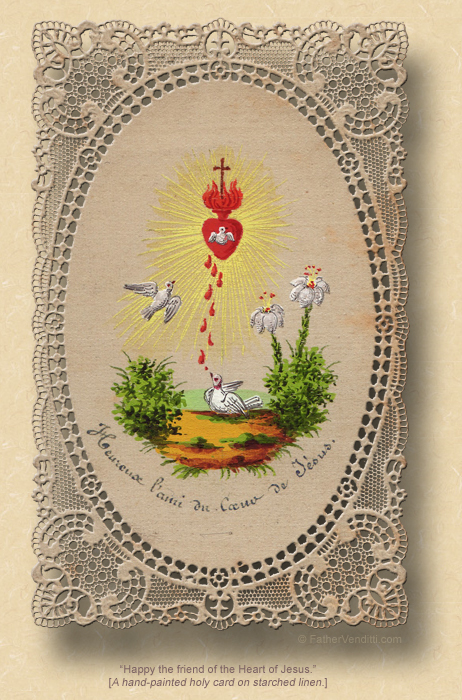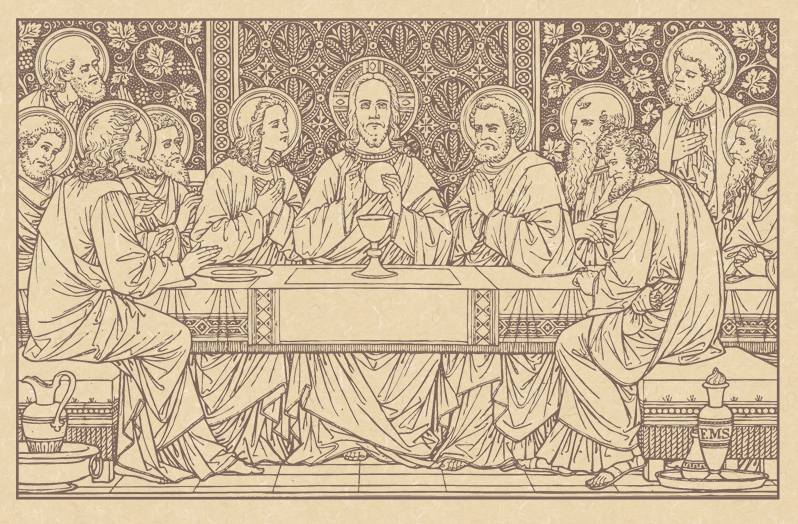Giving Thanks in Lonliness.
In the United States:
The Thirty-Third Thursday of Ordinary Time; the Memorial of Saint Clement I, Pope & Martyr; the Memorial of Saint Columban, Abbot; the Memorial of Blessed Miguel Agustín Pro, Priest & Martyr; or, the Memorial of Thanksgiving Day.
Lessons from the primary feria, according to the ordinary form of the Roman Rite:
• I Maccabees 2: 15-29.
• Psalm 50: 1-2, 5-6, 14-15.
• Luke 19: 41-44.
|
When a Mass for the memorial of Pope Saint Clement is taken, lessons from the feria as above, or from the proper:
• I Peter 5: 1-4.
• Psalm 89: 2-5, 21-22, 25, 27.
• Matthew 16: 13-19.
…or, any lessons from the common of Martyrs for One Martyr, or the common of Pastors for a Pope.
|
|
When a Mass for the memorial of Saint Columban is taken, lessons from the feria as above, or from the proper:
• Isaiah 52: 7-10.
• Psalm 96: 1-3, 7-8, 10.
• Luke 9: 57-62.
…or, any lessons from the common of Pastors for Missionaries, or the common of Holy Men & Women for an Abbot.
|
|
When a Mass for the memorial of Blessed Miguel Pro is taken, lessons from the feria as above, or, any lessons from the common of Martyrs for One Martyr, or the common of Pastors for One Pastor.
|
|
When a Mass for the memorial of the civic observance is taken, lessons from the feria as above, or any lessons from the Mass for Various Needs & Occasions for Giving Thanks to God.
|
|
Outside the United States:
The Thirty-Third Thursday of Ordinary Time; the Memorial of Saint Clement I, Pope & Martyr; or, the Memorial of Saint Columban, Abbot
Everything as above excluding anything regarding the memorial of Blessed Miguel Pro or the memorial for the civic observance (in Mexico: everything excluding the civil observance).
|
The Third Class Feast of Saint Clement, Pope & Martyr; and, the Commemoration of Saint Felicity, Martyr.*
First lesson from the proper, the rest from the common "Si diligis me…" for One or Several Holy Popes, according to the extraordinary form of the Roman Rite:
• Philippians 3: 17-21; 4: 1-3.
• Psalm 106: 32, 31.
• Matthew 16: 13-19.
|
When a Mass for the commemoration is taken, lessons from the common "Me expectavérunt…" of a Martyr not a Virgin:
• Ecclesiasticus 51: 13-17.
• Psalm 45: 6, 5.
• Matthew 13: 44-52.
|
The Twenty-Fourth Thursday after Pentecost (the Second of Philip's Fast); a Postfestive Day of the Entrance; and, the Feast of Our Holy Fathers Amphilochius, Bishop of Iconium, & Gregory, Bishop of Agrigento.**
First & third lessons from the pentecostarion, second & fourth from the menaion, according to the Ruthenian recension of the Byzantine Rite:
• II Thessalonians 2: 13—3: 5.
• Hebrews 13: 7-16.
• Luke 18: 31-34.
FatherVenditti.com
|
 7:53 AM 11/23/2017 — As you know, Holy Mother Church, in her solicitousness for local churches, has offered us a memorial for the civil observance of Thanksgiving Day. Last year, we offered that Mass together, and I preached a rather pompous homily recounting the origins of this holiday, from the initial proclamation of President Washington inaugurating the first Thanksgiving Day and what it meant, to President Lincoln’s decree making it an annual holiday during the time our country was embroiled in a bloody civil war. But this year we’re not going to offer that Mass. After all, it’s a busy day for most of us, and I think we are better served by brevity than by eloquence. Instead, of all the memorials offered to us on this day, I’ve chosen to offer the one probably most neglected: the Memorial of Blessed Father Miguel Augustín Pro. 7:53 AM 11/23/2017 — As you know, Holy Mother Church, in her solicitousness for local churches, has offered us a memorial for the civil observance of Thanksgiving Day. Last year, we offered that Mass together, and I preached a rather pompous homily recounting the origins of this holiday, from the initial proclamation of President Washington inaugurating the first Thanksgiving Day and what it meant, to President Lincoln’s decree making it an annual holiday during the time our country was embroiled in a bloody civil war. But this year we’re not going to offer that Mass. After all, it’s a busy day for most of us, and I think we are better served by brevity than by eloquence. Instead, of all the memorials offered to us on this day, I’ve chosen to offer the one probably most neglected: the Memorial of Blessed Father Miguel Augustín Pro.
There are, in fact, three memorials offered to us on this day: Pope Saint Clement I, who was the third pope after Peter, who was put to death in prison when it was discovered he was converting his fellow prisoners; Saint Columban, an Irish monk who founded a number of monasteries in France, and whose followers established many more in Germany, Switzerland and Italy. Father Pro’s memorial is observed only in the United States and in his native Mexico.
He was born in 1891 in the town of Guadalupe, and grew up with a great devotion to the Mother of God under that title. During the Mexican revolution he was forced to flee his own country, and was ordained to the priesthood for the Jesuits in Belgium, but returned to Mexico to minister to his own native people. He suffered from a lot of health problems, but always found a way to press on, always managing to stay one step ahead of the government which was seeking to obliterate the Church; but, they finally caught up with him, and he was executed by firing squad in 1927 at the age of thirty-six. The story of his brave death is quite famous: just before the soldiers fired, he stretched out his arms in the form of a cross, his rosary in one hand, and shouted, “Love live Christ the King!” There is, in fact, a photograph of him in this posture as he stood before the firing squad, taken just moments before he died.  There is, in fact, a film directed by John Huston and starring Henry Fonda called The Fugitive, which is loosely based on Father Pro’s life, and I highly recommend it. No names are mentioned in the film, but it’s pretty clear of whom the film is about. There is, in fact, a film directed by John Huston and starring Henry Fonda called The Fugitive, which is loosely based on Father Pro’s life, and I highly recommend it. No names are mentioned in the film, but it’s pretty clear of whom the film is about.
I don’t have to tell you that life presents us with all kinds of problems and trails. Some are big and some not so much; but, with the help of God’s grace, we can be made stronger by them. And this is true, I believe, regardless of whether the trials we face come from without, like the forces that pursued and killed Father Pro, or from within ourselves as the result of our own failures. “No servant can be greater than his master,” said our Lord. “They will persecute you just as they have persecuted me” (John 15: 20 Knox). And that persecution can come in many forms: physical, moral, spiritual, from outside us or even from within ourselves. During these times of darkness, our initial thought is to think of ourselves as alone, but we are never alone. With our faith to guide us, with hope to keep us afloat, we must always keep our minds fixed on our Lord, on the blessed Cross, and rely on Him. That doesn’t mean that things will turn out the way we hope they do, but our Lord doesn’t make empty promises.
On this day when our nation asks us to give thanks to our Lord for all the blessings we have received, we might be tempted, some of us, to doubt we have much reason to give thanks, especially those of us who will be spending this day alone;—not me, since I like to spend these holidays alone because I’m strange that way—but, as I said once not too long ago, the true friend of our Lord is never truly alone. Let’s ask Blessed Father Pro, who suffered loneliness to the point of giving his life, to intercede for us today, and help us all to be truly thankful, if for nothing else than the fact we faithful few, who love our Blessed Lord, have been given the great grace of a faithful Friend Who is ever at our side.

* Felicity, the mother of seven brothers who were all also matyrs, was beheaded shortly after her sons in the year 150.
** Cf. the footnote in the post here for an explanation of Philip's Fast.
Gregory was born in Sicily around 559 and died around 630. Amphilochius was a contemporary of Ss. Basil the Great, Gregory the Theologian and Gregory of Nyssa, assisting them in their struggle against the Arian heresy. He was consecrated Bishop of Iconium by Basil in 374. In 381 he was present at the Second Eccumenical Council in Constantinople, and died in 397.
|

